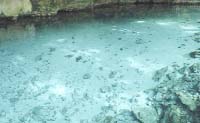
AFP, Vienna :
Human activity risks contaminating pristine water locked underground for millennia and long thought impervious to pollution, said a study Tuesday that warned of a looming threat to the crucial resource.
Even at depths of more than 250 metres (820 feet) under the Earth’s surface, so-called “fossil” groundwater-more than 12,000 years old-has been found to contain traces of present-day rainwater, they said.
This suggests that deep wells, believed to bring only unsullied, ancient water to the surface, are “vulnerable to contaminants derived from modern-day land uses,” study co-author Scott Jasechko, of the University of Calgary, told AFP.
Groundwater is rain or melted ice which filters through Earth’s rocky layers to gather in aquifers underground-a process that can take thousands, even millions, of years.
It is the largest store of unfrozen fresh water on the continents.
Groundwater is pumped to the surface by deep wells for drinking and irrigation, and supplies about a third of all human water needs-including safe drinking water for billions of people.
For the latest study, presented at a European Geosciences Union meeting in Vienna, Jasechko and a team set out to determine how much of Earth’s groundwater was more than 12,000 years old.
They used the carbon signature of “fossil” H2O-the bulk of groundwater pumped from wells deeper than 250 metres-to distinguish it from younger groundwater.
New groundwater has more radioactive carbon because it was more recently exposed to Earth’s atmosphere and shallow soil, tainted by nuclear tests since about the 1950s.
Fossil waters, in comparison, were isolated underground long before human activity could blight it.
The comparison showed that “a substantial share of global fresh waters are of fossil age, replenished more than 12,000 years ago,” Jasechko said.
Human activity risks contaminating pristine water locked underground for millennia and long thought impervious to pollution, said a study Tuesday that warned of a looming threat to the crucial resource.
Even at depths of more than 250 metres (820 feet) under the Earth’s surface, so-called “fossil” groundwater-more than 12,000 years old-has been found to contain traces of present-day rainwater, they said.
This suggests that deep wells, believed to bring only unsullied, ancient water to the surface, are “vulnerable to contaminants derived from modern-day land uses,” study co-author Scott Jasechko, of the University of Calgary, told AFP.
Groundwater is rain or melted ice which filters through Earth’s rocky layers to gather in aquifers underground-a process that can take thousands, even millions, of years.
It is the largest store of unfrozen fresh water on the continents.
Groundwater is pumped to the surface by deep wells for drinking and irrigation, and supplies about a third of all human water needs-including safe drinking water for billions of people.
For the latest study, presented at a European Geosciences Union meeting in Vienna, Jasechko and a team set out to determine how much of Earth’s groundwater was more than 12,000 years old.
They used the carbon signature of “fossil” H2O-the bulk of groundwater pumped from wells deeper than 250 metres-to distinguish it from younger groundwater.
New groundwater has more radioactive carbon because it was more recently exposed to Earth’s atmosphere and shallow soil, tainted by nuclear tests since about the 1950s.
Fossil waters, in comparison, were isolated underground long before human activity could blight it.
The comparison showed that “a substantial share of global fresh waters are of fossil age, replenished more than 12,000 years ago,” Jasechko said.

